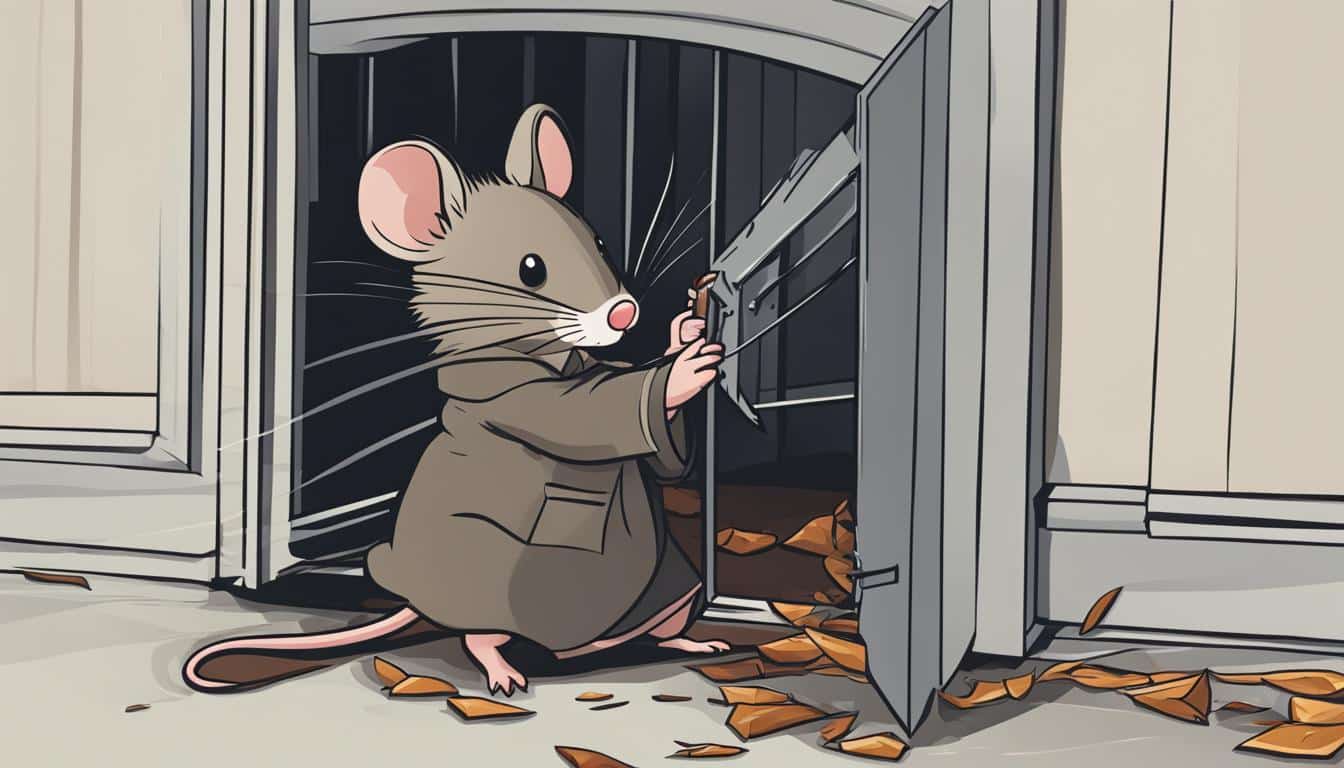
Did you know that rodents can cause extensive damage to your furnace and vents, leading to costly repairs? In fact, rodents are responsible for more than 25% of HVAC system failures in Canada. These pesky critters are not only a nuisance but can also pose a threat to the efficiency and safety of your heating and cooling system.
But worry not! In this article, we’ll show you how to outsmart these furry invaders and protect your home from their unwanted presence. We’ll discuss the signs of rodent infestation, how to block their entry points, deal with unpleasant odors, safeguard your HVAC system, and maintain a rodent-free environment through regular maintenance.
Understanding the Signs of Rodent Infestation
When it comes to rodents, their presence often comes with distinct odors that can be quite unpleasant. If you start noticing unfamiliar and pungent smells in your home, it could be a sign that rodents have made themselves comfortable in your space. The strong odor could be due to their urine, feces, or the decomposition of dead rodents. It’s crucial not to ignore these smells as they indicate an ongoing infestation that requires immediate attention.
But it’s not just the smell that can give away the presence of rodents. They tend to leave behind other noticeable signs as well. Keep an eye out for gnawed cables or furniture legs, chewed food packages, or shredded paper or fabric. These are all signs that rodents have been using your space to build their nests or search for food.
Listen closely for any unusual sounds too. Rodents are often active during the night, so you might hear scratching, squeaking, or scampering noises coming from your walls, ceilings, or crawl spaces. These sounds indicate their presence and should not be ignored.
Furthermore, look for visible droppings in areas where rodents tend to frequent. Their droppings are typically small, dark, and cylindrical in shape. Finding these droppings in your home is a strong indication that rodent activity is taking place.
To sum it up, if you notice strange smells, gnawed items, peculiar sounds, or rodent droppings in your home, it’s highly likely that you have a rodent infestation. Prompt action is crucial to prevent further damage and ensure a pest-free environment.
We don’t want to let this happen, don’t we? :-)

Blocking Rodent Entry Points
Now that you know you have unwanted guests scurrying through your home, it’s time to take action and block their entry points. Preventing rodents from infiltrating your furnace and vents is crucial to maintaining a pest-free environment. We’ll guide you through the process of sealing off these access points, ensuring those pesky rodents stay out for good.
To begin, let’s tackle the furnace. Check for any gaps or openings around the furnace and its surrounding areas. Rodents are notorious for squeezing through small spaces, so be thorough in your inspection. Use weather-stripping or metal mesh to cover any cracks or crevices. This will not only keep rodents out but also enhance the energy efficiency of your furnace, preventing heat loss.
Next up are the vents. Visualize your vents as potential highway entrances for rodents. To block these paths, install vent covers or grilles with fine mesh. These covers will allow proper airflow while acting as a barrier to prevent rodents from entering. Remember, it’s crucial to choose covers with a mesh size small enough to keep the smallest of intruders out. In addition to blocking rodents, these covers will protect your vents from dust and debris accumulation.
While blocking entry points is an effective way to deter rodents, sometimes it’s necessary to call in the professionals. An exterminator can assess the situation, identify entry points you may have missed, and provide expert assistance in rodent control. They have the knowledge and tools to eradicate the current infestation and implement preventive measures to keep rodents at bay.
Remember, when it comes to rodent control, prevention is key. By blocking their entry points, you’re eliminating the welcome mat and making it harder for rodents to invade your home. Stay proactive and be vigilant in inspecting and reinforcing these vulnerable areas. Your efforts will create a fortress against furry intruders and ensure a rodent-free environment for you and your family.

Dealing with Unpleasant Smells from Dead Rodents
Unfortunately, when you have a pest infestation, particularly with rodents, you may also have to deal with the unpleasant odor of dead mice. The smell can linger in your home and make it hard to enjoy your living space. But don’t worry, we’ve got some effective methods for getting rid of that lingering smell and ensuring your home remains fresh and odor-free.
The first step in eliminating the smell is to locate the source. Look for any signs of dead mice or nests in areas where you’ve noticed a strong odor. Be cautious and wear gloves when handling any dead rodents to avoid any potential health risks.
Once you’ve found the source, it’s time to remove it. Carefully dispose of the dead rodents and their nesting materials. Seal them in a plastic bag before placing them in an outdoor trash bin.
To combat the lingering odor, there are a few remedies you can try:
- Baking soda: Sprinkle baking soda around the affected area and let it sit for a few hours or overnight. Baking soda is known for its ability to absorb odors. Vacuum or sweep up the baking soda afterward.
- White vinegar: Fill a bowl with white vinegar and place it near the source of the odor. Vinegar has natural deodorizing properties and can help neutralize the smell. Leave it overnight and dispose of the vinegar the next day.
- Activated charcoal: Place activated charcoal near the affected area. Charcoal is known for its ability to absorb odors, making it an effective remedy for removing the smell of dead rodents.
If the smell persists or you prefer professional assistance, consider contacting a pest removal service. They have the expertise and tools to handle the situation effectively and safely.
Remember, it’s essential to address the odor of dead rodents promptly to ensure a fresh and enjoyable living environment.

Safeguarding Your HVAC System
When it comes to your heating and cooling system, protecting it from rodent interference is crucial. Rodents have a knack for causing damage, leaving you with expensive repairs and a malfunctioning HVAC system. But fear not! We have some tips to help you safeguard your prized HVAC system and keep those pesky rodents at bay.
- Seal Off Potential Entry Points: Rodents are crafty little creatures that can squeeze through tiny gaps. Inspect your HVAC system for any openings or cracks and seal them off using materials like steel wool or caulk. Remember, even the smallest hole can be an invitation for rodents.
- Maintain a Clean Surrounding: An untidy environment can attract rodents, so make sure to keep the area around your HVAC system clean and clutter-free. Remove any debris or vegetation that may provide a cozy hiding spot for these unwanted guests.
- Use Rodent-Proof Covers: Invest in rodent-proof covers for your vents and openings. These covers are designed to keep rodents out while allowing proper airflow for your HVAC system. It’s a win-win situation!
- Trim Nearby Trees and Shrubs: Overhanging branches or dense shrubbery can act as a bridge for rodents to access your HVAC system. Keep them at a safe distance by regularly trimming and maintaining your landscaping.
By following these simple yet effective tips, you can protect your HVAC system from rodent interference and keep it running smoothly. Remember, prevention is always better than dealing with costly repairs down the line. So, take action today and bid those rodents farewell!
Maintaining a Rodent-Free Environment with Regular Maintenance
When it comes to pesky rodents, prevention is your best line of defense. By implementing regular maintenance practices, you can keep those furry intruders at bay and ensure a rodent-free environment in your home.
One of the most crucial steps in rodent control is to eliminate any potential entry points. Conduct a thorough inspection of your property, sealing off cracks, gaps, and holes where rodents could squeeze through. Remember, rodents can fit through incredibly small spaces, so don’t underestimate their ability to find a way into your home.
Keep your home clean and clutter-free, as proper sanitation is key to preventing rodents from making themselves at home. Regularly dispose of garbage in secure containers, and promptly clean up any food or drink spills. By denying them a reliable food source, rodents are less likely to stick around.
FAQ 🤔
What are the signs of a rodent infestation?
Signs of a rodent infestation may include droppings, gnaw marks, strange sounds, and a strong, unpleasant smell. If you notice any of these signs, it’s important to take action immediately to prevent further rodent intrusion.
How can I block rodents from entering my furnace and vents?
To block rodents, you can start by sealing any gaps or cracks around your furnace and vent openings using steel wool or caulk. It’s also essential to keep nearby areas clean and free of debris to discourage rodents from nesting. If the problem persists, consider contacting a professional exterminator for assistance.
How can I get rid of the smell from dead mice?
To eliminate the odor from dead mice, you can try spraying a mixture of water and vinegar around the affected area. Baking soda and activated charcoal can also help absorb unpleasant smells. Make sure to dispose of the dead rodents properly and take measures to prevent future infestations.
How do I safeguard my HVAC system from rodents?
To safeguard your HVAC system, it’s important to block any potential entry points for rodents, such as gaps in your ductwork or vents. Regularly inspect and maintain your system to ensure that it remains rodent-free. If you suspect rodent activity, consider placing traps or contacting a pest control professional for assistance.
What steps can I take to maintain a rodent-free environment?
Regular maintenance is key to maintaining a rodent-free environment. Keep your home clean and clutter-free, seal any openings or cracks in walls and floors, and store food in secure containers. Regularly inspect your property for signs of rodent activity and take prompt action if you detect any problems.
